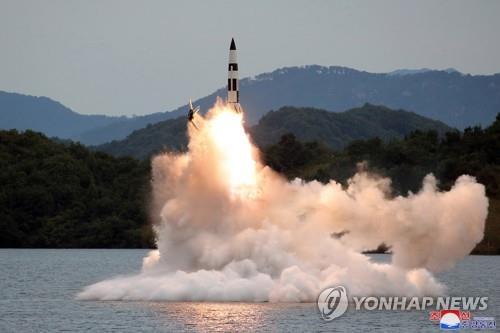 |
| ▲ This file photo, released by North Korea's Korean Central News Agency on Oct. 10, 2022, shows a missile launched from an underwater platform in the North. (For Use Only in the Republic of Korea. No Redistribution) (Yonhap) |
US-nuclear deterrence report
Nuclear arms of N. Korea, China, Russia pose 'existential' dangers to U.S., its allies: report
By Song Sang-ho
WASHINGTON, Nov. 15 (Yonhap) -- The nuclear weapons of North Korea, China and Russia continue to present "existential" dangers to the United States and its allies, according to a report by a U.S. government advisory board released Wednesday.
The State Department's International Security Advisory Board (ISAB) released the Report on Deterrence in a World of Nuclear Multipolarity, stressing that tackling the dangers from potential adversaries must be prioritized.
"Nuclear weapons in the hands of these and other adversaries, including the Democratic People's Republic of Korea, continue to pose existential dangers to the United States and its friends, partners and allies around the world," the report said, referring to the North by its official name. "Thus responding effectively to these developments must be a national priority."
The report noted the nuclear challenge as it highlighted that the U.S. is now facing two nuclear near-peer competitors -- Russia and China.
"Russia, a former partner in nuclear risk reduction, has used nuclear threats as tools of coercion in its illegal invasion of Ukraine," the report said. "The PRC is seeking to significantly expand its arsenal."
PRC stands for China's official name, the People's Republic of China.
The report, in particular, cited a 2022 Pentagon report projecting that Beijing's nuclear arsenal could reach a stockpile of 1,500 warheads by 2035.
It also pointed out that the rapid diffusion of technology means U.S. allies are much less dependent on America for advanced technology.
"The gradual abandonment of the U.S.-Republic of Korea missile guidelines over the past two decades illustrates the declining relevance of technology controls in discouraging allies' proliferation," it said, referring to South Korea by its official name.
"But allies' military ambitions could also entail the pursuit of nuclear weapons. This should be categorically opposed by the United States," it added.
In 2021, Seoul and Washington lifted their missile guideline restrictions that had barred the South from developing or possessing ballistic missiles with a maximum range greater than 800 kilometers.
The ISAB is overseen by the under secretary of state for arms control and international security and provides its recommendations to the secretary through the under secretary.
(END)
(C) Yonhap News Agency. All Rights Reserved












![[가요소식] 조항조, 새 싱글 '아버지란 그 이름' 발표](https://korean-vibe.com/news/data/20251116/yna1065624915927473_582.jpg)










